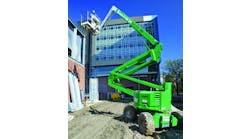Ohio may not be geographically huge, but the United States' seventh most populous state provides a good lens to look at the state of the union. While not the exact geographic center of the country, it's not far away from it. Viewed as a major swing state in U.S. national elections, conventional political wisdom tells presidential candidates that if they capture Ohio, they'll capture the White House. It certainly was the case in 2008 and, in fact, since 1940 Ohio has voted for the loser in the presidential election only once, backing Richard Nixon in 1960.
So is it fair to say how goes Ohio goes the nation? Well, not always and not in every respect, but it is often an accurate bellwether. Given the current situation in its rental market, the rental industry should hope it is not a reflection of the larger picture as the current view of rental companies there is not an encouraging one.
Ohio has been hard hit by the current recession. While some states might have it worse, especially in the western U.S., Ohioans were cheered when the unemployment rate fell to 10.1 percent in September. After all, it had been 10.8 percent in August and 11.2 percent in July.
Ohio rental people interviewed for this article by RER agree about one major issue: business is slow, there is minimal demand, customers often don't know where their next job is coming from, and a turnaround, if in sight, is so far down at the other end of the telescope that it can't be clearly recognized or sensed in terms of distance and strength.
“It's not all gloom and doom, but some people are going through some pretty hard times,” says Steve Pedersen, of Brown County Rental in Aberdeen. “We haven't seen rental companies go out of business, but we're seeing a lot of equipment parked in peoples' yards, and there's more in our yard than usual. Many contractors are not doing what they used to do. There were old contracts worked on, and now those projects are ending and they don't have replacement work. Most stimulus money is being spent on roadway projects, by contractors who have their own equipment. It doesn't put a big boost into rentals.”
Mary Hosafros of Gauer Rental in Akron sees it pretty much the same way. “We've seen a lot more bosses coming in now, because they laid everybody else off,” says Hosafros about her contractor customers. “They don't have a lot planned. A couple of architects we know don't see work coming in either. Next year doesn't sound like it's going to be very good.”
Most regions of the state have been hit hard. For example, things are bleak in Cleveland, where the economy draws much of its vitality — or lack of it — from the auto industry.
“Northeast Ohio is the No. 1 support area for the auto industry,” says Mike Miller of Handy Rents and Aladdin Rents, based in Eastlake, serving the Cleveland, Akron and Toledo areas. “Even though Michigan is looked upon as the car capital of the United States, the state of Ohio is the No. 1 state for supporting machine shops and so forth, and Cleveland used to be known as the machine tool capital of the world until 30 to 40 years ago. So the good jobs have been diminishing over 20 to 30 years here, and it's taken its toll. With all the other problems with the economy and the real estate industry, it all adds up to nothing going on in Cleveland. We've been through recessions about once every 10 years, but certainly nothing like this, this is a completely different animal.”
Rental people in Ohio see customer attitudes and practices changing as they cut corners to make ends meet. “There's very little work, so where a guy used to take a lift and keep it for a week or a month, now he's telling us it's going to be a week or two weeks, and then three days later calling it off rental to try to save himself some bucks,” says Alan Zatik, owner of ABC Equipment in Brunswick. “In most cases they bid these jobs at bare bones or as close to cost as possible so there's very little money in it for them. Where they used to leave the lift on a job in case they needed it, it just isn't happening now. Now they return it and if they want it again, they'll come rent it again.”
It's not any easier for companies with mostly homeowner clientele. “We're going into our slow season in the middle of Ohio, I just wish we had what we would have normally had the rest of the year to keep a little cushion,” says Terry Moore of Murray's Tool Rental in Columbus. “It's going to be a little tough to make it through the winter. Homeowner customers are just not starting the projects they would normally start if they had the money. They're just fixing what they have to fix right away.”
Certain tools slated for emergency needs have done relatively well despite the slowdown for obvious reasons. While drain-cleaning equipment isn't getting the call for construction-related plumbing projects, when people need to fix their pipes for the short term, they have little choice. Landscaping equipment has held its own also. While sophisticated landscaping projects are down, basic lawn and garden maintenance generally has to be done no matter what the economy is like.
Feeding frenzy
When customers do rent, returns are a lot less than what rental companies need to be profitable. “Contractors are bidding jobs so much closer and tighter that the profit levels aren't there anymore,” says Jake Gordon of Walker Express, based in Nitro, West Va., with two branches in Ohio in addition to four in West Virginia. “We're having to adjust the rates down because everybody is hungry and are going after it like a feeding frenzy and cutting their rates.”
“We've heard a lot of contractors taking jobs just to keep guys working, they don't really expect to make money off the job,” adds Hosafros. “But it keeps a little cash flow coming in and just pays the bills.”
Arlen Swenson, general manager of Hamilton, Ohio-based Bobcat Enterprises, which has six branches primarily near Cincinnati and covers southern Ohio and northern Kentucky, says current rental rates are “some of the most aggressive I've seen in a long time,” echoing a view expressed by many.
“It's that old story,” says Swenson. “Once you've bought a rental asset and you're running a rent-to-rent business, now you need revenue. So, some revenue is better than no revenue and it's pretty brutal out there right now.”
Most rental companies in Ohio agree that housing construction is, as Cincy Tool's Don Bruner says, “non-existent,” and commercial construction isn't faring much better.
Neither is the industrial market.
“We have one of the largest Dupont plants in the area, we have some GE's and other companies like that but they've started pulling back a lot too,” says Gordon. “They've cut back on their capital expenditures and improvements and plant expansions; they've pulled in everything.”
“This is a hard enough thump on the head,” adds Swenson. “Residential goes down and now commercial is down.”
Not too stimulating
This year's great hope for the construction industry was the American Recovery and Reinvestment Act of 2009, popularly referred to as the stimulus package. However, most rental people in Ohio say they have yet to see many results from it, at least not ones that impact their businesses as little stimulus money is filtering down to the small contractors that tend to be the bread and butter of most independent rental businesses.
“Most of what we've seen from the stimulus so far has been just re-surfacing jobs, road re-surfacing and bridge, and normally the companies that are doing that are pretty well equipped with what they need already,” says Gordon. “So the stimulus hasn't really helped very much.”
“Here in Cincinnati there are some individual projects going on, there's what's called the Banks Project, and there's a large downtown new office building going in, 55 stories or so,” says Swenson. “So there are some individual projects that we can point to to say there are some things going on, but we really haven't seen a lot of stimulus money or ‘shovel-ready projects.’”
Others, however, point out that if stimulus investment puts contractors to work it will help them ultimately even if not immediately.
“In the Cleveland area, there's a lot of freeway work, it seems like they are tearing up every freeway and bridge around Cleveland,” says Handy Rents' Miller. “It eventually will trickle down to the smaller guys because when the big guys have work to do, they don't take the little guys' jobs. And now these big guys are going back to work, slowly. And I emphasize slowly.”
Miller points out that whether or not “stimulus money” directly comes to rental, it will have the beneficial effect of depleting inventories as whoever is doing those jobs will have to use tools, equipment and supplies. “People do have to order things eventually,” Miller says. “Inventories in all companies eventually get depleted over time and that's the big thing that will drive the economy next year. If people have six boxes on the shelf, eventually you'll sell them and you've got to replace them.”
Is growth possible?
For most rental companies right now, trying to survive and stay afloat is the name of the game, avoid having to lay off trusted staff, keep up with payroll and all the other business expenses. A few are even trying to make aggressive moves in spite of little confidence that the economy will improve in the foreseeable future. Some, such as Miller, believe that going forward is necessary even in tough times. Miller opened a new store in Kent in December.
“It was in a spot where other rental stores were in the past and it had been vacant for a year,” Miller says. “It has Kent State University there, it's a college town, there's no reason a rental store can't succeed there. There's quite a few competitors, but I just decided I'm going to take a chance and open it, so I did that and that caused me to buy a bucketload of items. And it has met my expectations.
“I'm always interested in trying to expand, a lot of my staff is pretty young. We have about 35 full-time employees right now, between all our locations, so I'm still excited about the future; it's just difficult to get through these times.”
Others, like ABC, are experimenting with Internet marketing, going away from more traditional methods such as Yellow Pages and working to expand their online presence.
“We've even gone on a couple of jobsites and sponsored some jobsite meetings for new jobs and projects to try to get a chance to get in touch with everybody ahead of time and say ‘We're here, we'll do what we can to get your business and don't forget about us,’ ” adds ABC's Zatik.
Most are avoiding major capital expenditures and don't want to spend a lot of money on equipment at this time, but know that replacement will be necessary on some items.
“You do less, you buy less,” says Brown County Rental's Pederson. “We'll buy less equipment than we'd normally buy, from demolition hammers to bulldozers and track hoes. We have to monitor our expenditures very carefully.”
Monitoring carefully will likely be the m.o. of most Ohio rental companies over the next year, watching the economy and their customer bases for signs of life.
“Small contractors are worrying about the health-care bill, what is it going to cost them,” says Walker's Gordon. “They are worrying about the “cap and trade” bill (Climate Security Act) and what will it really cost us if it goes through. What will energy costs be in the future, how do you cope with that? How do you pass the costs on? That's all the things we're worried about.”
Gordon pauses as he considers the overall situation. “I don't think it's totally dark, but it's gray,” he adds.





